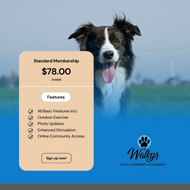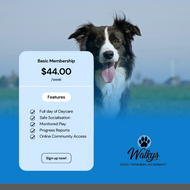May 5, 2025
Feeding the Mind: How Nutrition and Fulfilment Shape Canine Behaviour
Your dog’s dinner bowl could be influencing far more than just their physical health. Emerging research highlights how nutrition and psychological fulfilment significantly shape canine behaviour, from aggression and anxiety to cognition and social interaction.
🧠 1. Nutrients That Influence Brain Chemistry and Behaviour
Dogs’ behaviours are largely governed by brain chemicals like serotonin, dopamine, and catecholamines—all of which are affected by what they eat.
-
Tryptophan, a precursor to serotonin, has been shown to reduce aggression and improve stress resilience when added to dog diets (Bosch et al., 2007), (Harju, 2016).
-
Omega-3 fatty acids, particularly DHA, play a critical role in brain development and cognitive performance, influencing behaviours tied to memory, learning, and mood (Bosch et al., 2007).
-
Dietary protein levels also matter—high-protein diets can be linked to increased aggression in some dogs, while lower protein with supplemental tryptophan has shown behavioural benefits (Houpt & Zicker, 2003).
🍽️ 2. Satiety, Fibre, and Behavioural Satisfaction
-
Lack of satiety between meals can lead to agitation, stereotyped behaviours (e.g., pacing or barking), and even increased aggression. This can be alleviated by dietary fibre, especially fermentable fibres that prolong fullness and support gut health (Bosch et al., 2007), (Harju, 2016).
-
Nutritional imbalances or deficiencies (such as of essential amino acids or vitamins) can manifest as behavioural issues like hyperactivity, irritability, or reduced cognitive function (Houpt & Zicker, 2003).
💡 3. Cognitive Decline and Age-Related Behavioural Changes
In senior dogs, poor diet is closely linked to cognitive dysfunction, manifesting as confusion, disrupted sleep patterns, and reduced social interaction. Diets rich in antioxidants, medium-chain triglycerides, and mitochondrial cofactors can help improve or stabilize cognitive performance in aging dogs (Manteca, 2011), (Tynes & Landsberg, 2021).
🐾 4. Fulfilment, Enrichment, and Emotional Well-Being
While nutrition lays the biochemical foundation, fulfilment—emotional and environmental enrichment—supports behavioural stability:
-
Dogs deprived of mental stimulation or positive interactions show elevated stress hormones, increased destructiveness, and even self-harming behaviours (Better Behavior through the Food Dish, 2018).
-
Fulfilment strategies include puzzle feeders, social interaction, sensory experiences, and consistent routines—all critical for behavioural balance.
🧩 Conclusion: Food and Fulfilment as Behavioural Tools
Behavioural issues in dogs aren’t always rooted in training failures—they may stem from poor diets and unmet emotional needs. Addressing nutrition and enrichment simultaneously gives our canine companions the best chance at a balanced, happy life.








